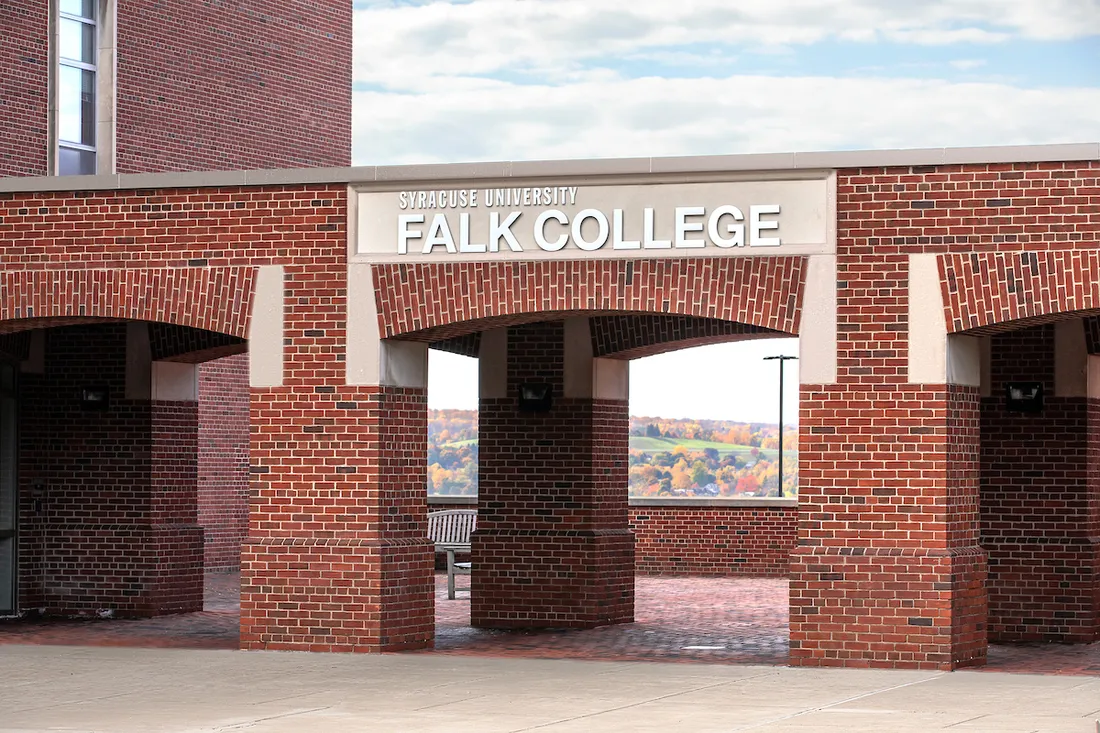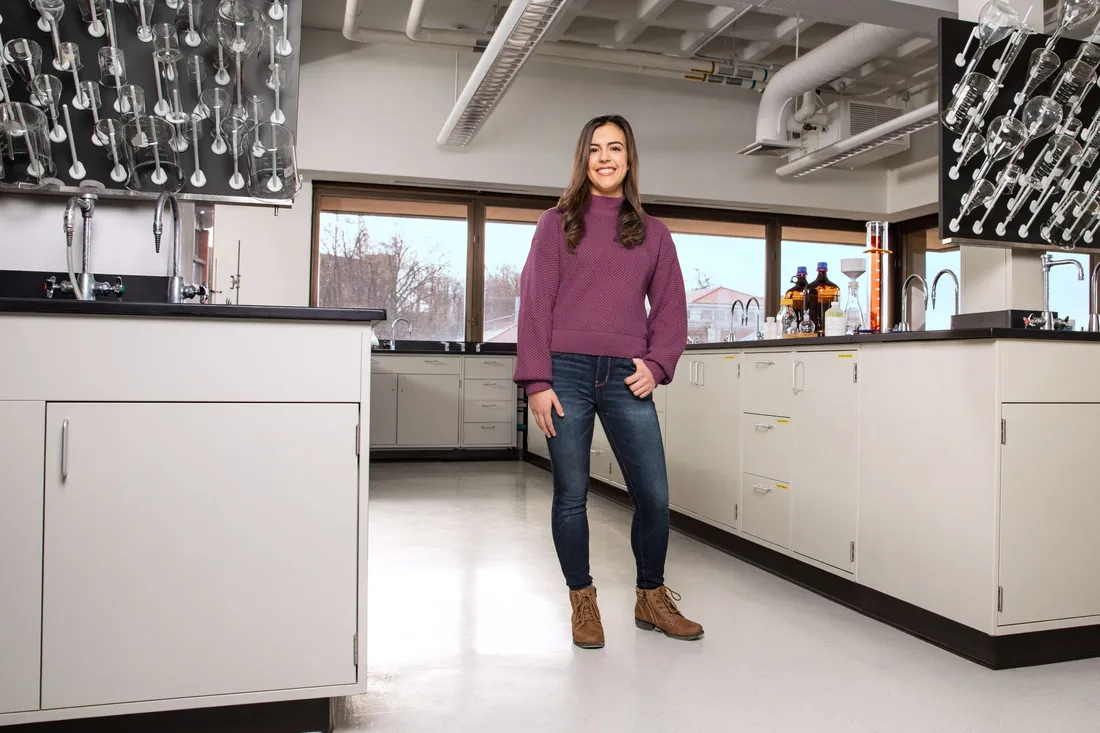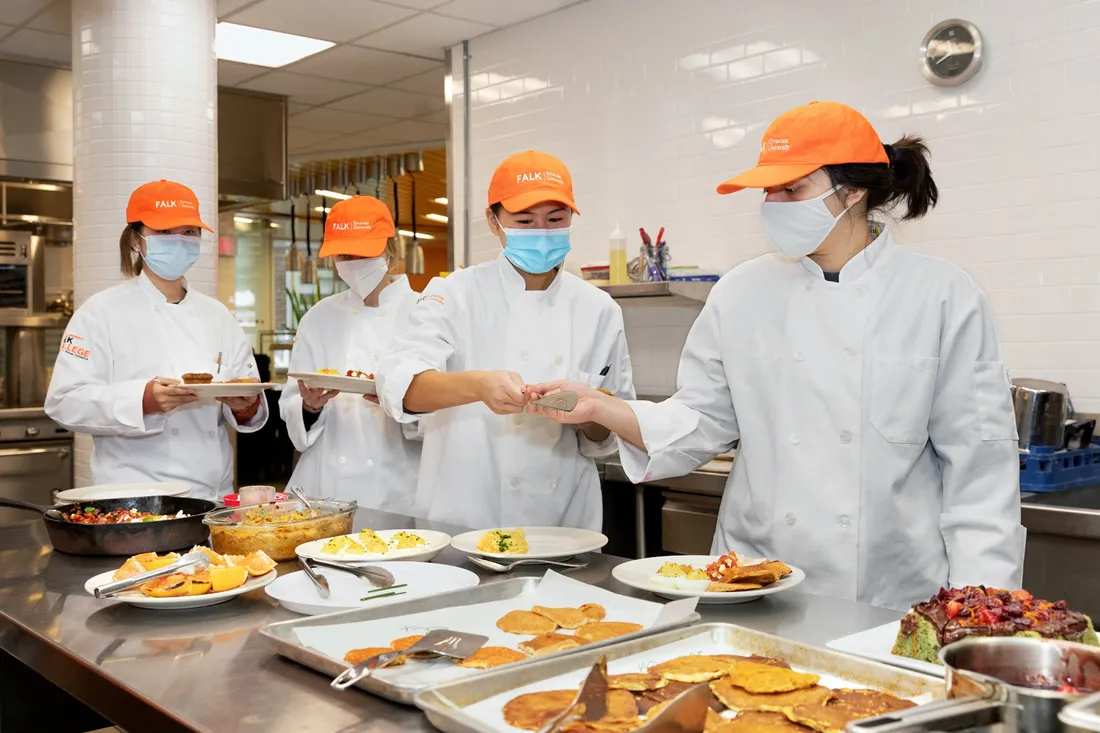
Medical students create healthy dishes at Culinary Medicine Day, a popular feature of the Food as Medicine course offered by Falk College faculty.
Natalie Antosh was a third-year student at Upstate Medical University in 2019 when she noticed a gap in the medical school curriculum—there was little nutrition content. Acutely aware of the role nutrition plays in many diseases, she decided to survey her fellow medical students and found that the majority wanted more nutrition instruction. Ninety-five percent said they would welcome an elective nutrition course.
Antosh teamed up with Dr. Barbara Feuerstein, a professor of medicine at Upstate and an endocrinologist at the Joslin Diabetes Center, and Dr. Beth Nelson, a professor of pediatrics at Upstate, to brainstorm about creating a nutrition course. Nelson had completed a master’s degree in nutrition at Syracuse University’s David B. Falk College of Sport and Human Dynamics prior to attending medical school and knew that the Falk faculty expertise was just what they needed. They reached out to professors Kay Stearns Bruening and Sudha Raj in Falk’s Department of Nutrition and Food Studies and began designing a nutrition course for fall 2019.
Within hours of announcing the addition of a new elective called Food as Medicine, the class was filled.
The alliance between Falk and Upstate provides a seat at the table for the nutrition professional along with medical and allied health professionals. We’re fostering a health care climate where nutrition is seen as part of the health care paradigm.
Professor Sudha Raj
Developing a Curriculum
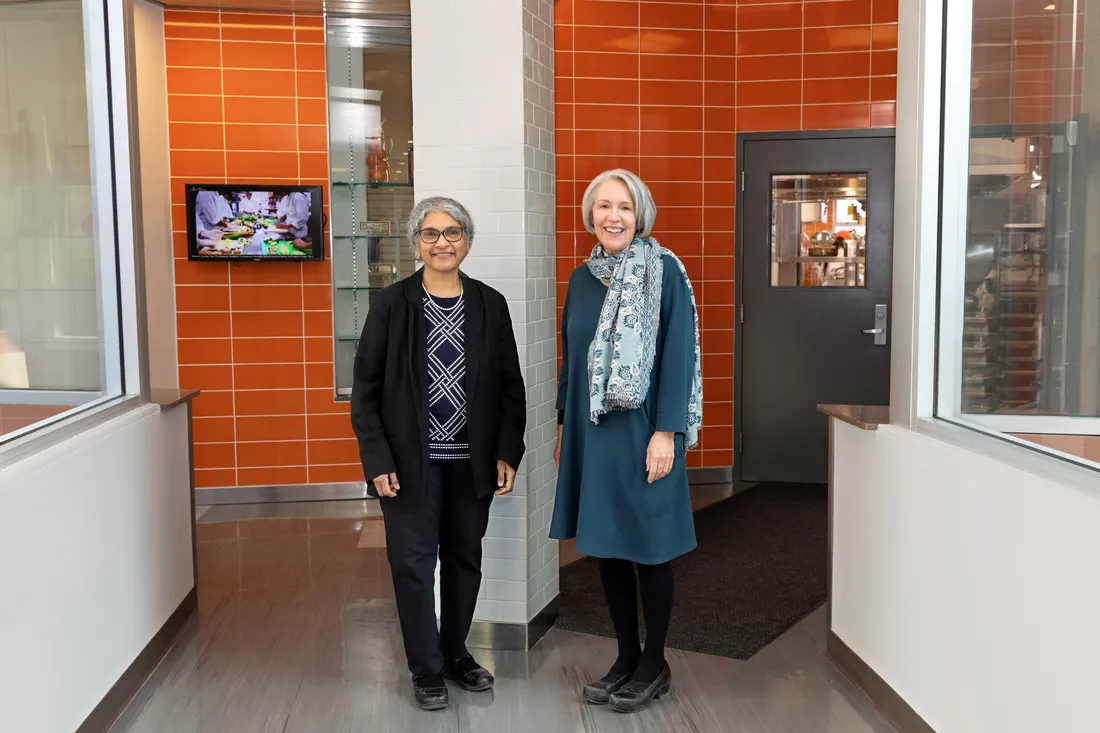
Falk nutrition professors Sudha Raj (left) and Kay Stearns Bruening (right) collaborated with doctors at Upstate Medical Center to design a course exploring the intersection of nutrition and health.
Bruening, director of Falk’s Nutrition Assessment, Consultation and Education Center, was asked to provide an introduction and an overview for the course, as well as a session on fad diets. “I taught it as a session on the world’s healthiest diets and what they have in common, and then organized a presentation of whole foods by food group with an emphasis on their clinical medical implications,” she recalls.
Bruening notes that the Food as Medicine course content is different from what she uses in her Falk clinical courses. “My Falk courses include content on the pathophysiology of diseases, how it affects nutrition status and the nutrition care process,” she says. “Medical students would already know the pathophysiology, and their approach to assessing patients is different from the approach of nutrition professionals.”
Feuerstein points out that medical students will go into many different specialties, so they have a variety of reasons to take the course. “Beyond professional applications, I think some students also found the nutrition class helpful for their own lives—one assignment on taking a nutrition history from a family member had some enlightening surprises for many students.” And the course provides a variety of experiences that are especially valuable for expanding medical students’ perspectives. “Shadowing an Overeaters Anonymous session, sitting in with various dietitians and creating a cookbook are great learning experiences for our medical students,” she says.
We teach medical students a systems biology approach to integrate diet, genetics and lifestyle to address underlying causes of chronic disease.
Professor Sudha Raj
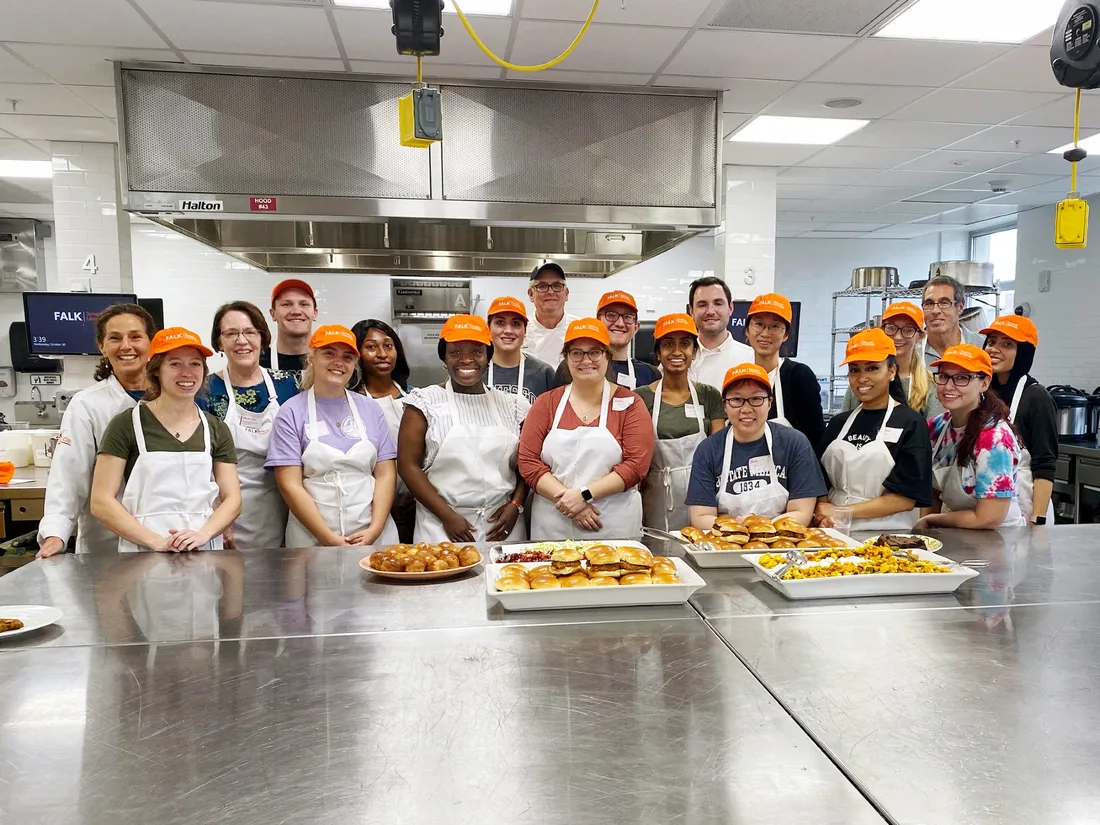
Students from Upstate Medical University gathered in the Falk College teaching kitchens for the first Culinary Medicine Day in 2019, with Dr. Barbara Feuerstein, Natalie Antosh and Professor Kay Stearns Bruening (front left) and Falk culinary specialist Bill Collins (back center). Photo courtesy of Upstate Medical University.
Raj, who directs Falk’s graduate programs in nutrition science as well as the new online Certificate of Advanced Study (CAS) in Integrative and Functional Nutrition, developed a module on functional nutrition for the course. “We teach medical students a systems biology approach to integrate diet, genetics and lifestyle to address underlying causes of chronic disease,” she says. Additional modules addressed obesity, diabetes, cardiovascular disease, pregnancy, pediatrics, oncology and cancer prevention, and vegetarian diets.
Building Bridges
Raj believes the course builds a bridge between medicine and nutrition that benefits the entire community. “The alliance between Falk and Upstate provides a seat at the table for the nutrition professional along with medical and allied health professionals,” she says. “We’re fostering a health care climate where nutrition is seen as part of the health care paradigm—not a separate entity—and emphasizes a partnership between patient, physician and the nutrition professional for sustained long-term health.”
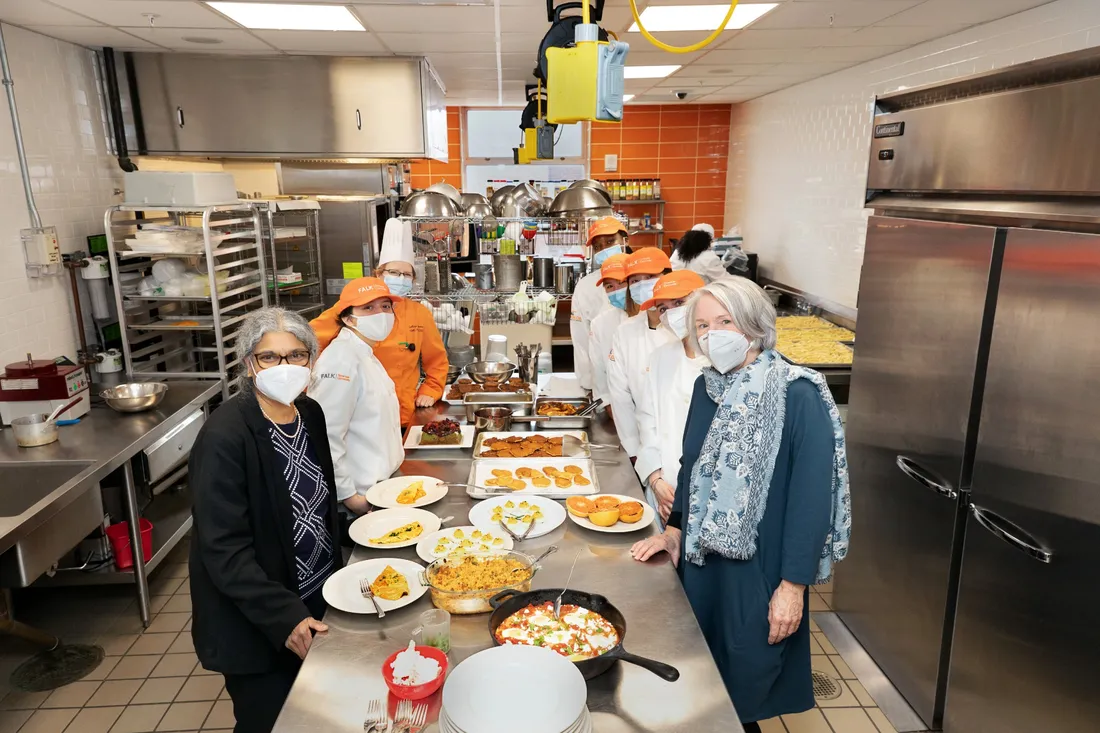
Chef Mary Kiernan (back left) assists future doctors and professors Sudha Raj and Kay Stearns Bruening (front, left to right) in Falk College's Susan R. Klenk Learning Café and Kitchens.
The collaboration also reinforces Syracuse University’s commitment to experiential learning and community service, and it has created valuable opportunities for students from both institutions. “For the past two years I’ve taken part in an interdisciplinary education initiative with a colleague who teaches in the Respiratory Therapy program at Upstate,” says Bruening. “This year, I led a lecture and workshop on nutrition and respiratory function for her respiratory therapy students. She, in turn, took small groups of Falk students from my Medical Nutrition Therapy class to her teaching lab at Upstate, where they learned about respiratory interventions and intubated a mannequin. The nutrition science students loved it, and the dietetics students learned firsthand how respiratory interventions that keep patients alive can affect their ability to obtain adequate nutrition.”
Community partners like Brady Farm and the University United Methodist Church food pantry provide guest speakers and field trip opportunities for students, and Food Bank of Central New York offers sessions with local nutritionists and registered dietitians. One was led by Falk nutrition alumnus Deb Mimaroglu ’14 and another by Heather Brubaker G’18, who focused on how trauma can affect interactions with participants in nutrition education and counseling sessions.
Our hope is that the long-term effect will be better patient care and health outcomes.
Professor Kay Stearns Bruening
A popular feature of the course is Culinary Medicine Day, when students create and taste healthy, plant-forward dishes. It was originally held in the Falk teaching kitchens with the help of Falk culinary specialist Bill Collins, but in 2020 pandemic restrictions inspired Bruening to switch to a live virtual presentation from her home kitchen. It was so flexible and cost effective they decided to conduct the 2021 event virtually again, this time in Feuerstein’s home kitchen.
Enriching Falk Students
Raj says teaching has been her passion since high school. “I see teaching as a two-way street where I share my knowledge and at the same time I learn from my students, peers and colleagues,” she says. “They have nourished my personal and professional development through the years, and I think I am better for it.”
Bruening echoes that admiration for Falk College students. “Our students share a passion for the relationship between food and health,” she says. “Education standards are so much more rigorous than when I was a student, and Falk students rise to those challenges. I have tremendous respect for them.”
Beyond professional applications, I think some students also found the nutrition class helpful for their own lives—one assignment on taking a nutrition history from a family member had some enlightening surprises for many students.
Dr. Barbara Feuerstein
In August 2020, Bruening was named a clinical instructor in Upstate’s Department of Medicine. It is an honor that recognizes her voluntary role and gives her access to Upstate Medical University’s library resources. “I think the sharing of expertise and resources creates a two-way benefit,” Bruening says. “Physician graduates from Upstate gain specific understanding of the significance of nutrition in the causes and treatment of disease and the role of nutrition professionals in patient care. And I learn things from the medical students and faculty that I share with our nutrition students. Our hope is that the long-term effect will be better patient care and health outcomes.”

